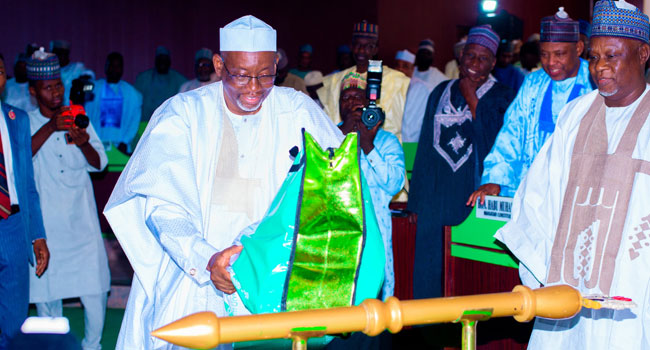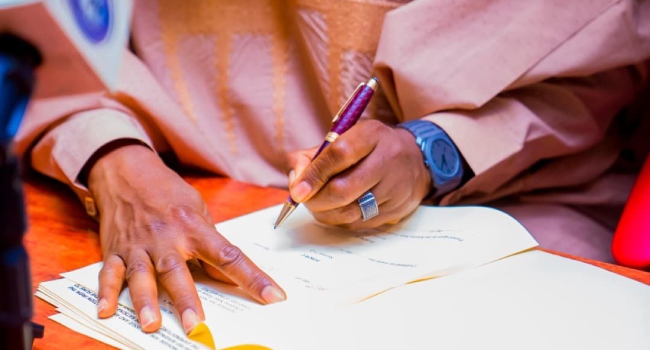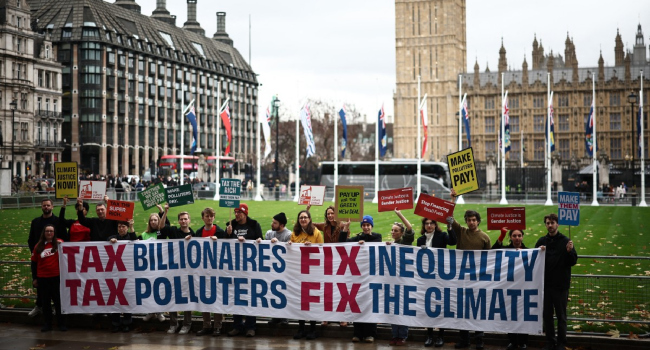The budget, titled “Budget of Innovation & Transformation for Greater Jigawa II,” represents a 19.2% increase from the 2025 appropriation.
According to the governor, the proposal is anchored on the recently approved third edition of the Jigawa State Comprehensive Development Framework, which incorporates the government’s 12-Point Agenda.
Speaking during the presentation, the Governor said: “The 2026 proposed budget will majorly adopt the philosophy and policy thrust that informed the 2025 budget. Our major focus will be the pursuit of inclusive and human-centred economic growth, leveraging agriculture, SMEs, and critical infrastructure.”
READ ALSO: Gov Yusuf Presents ₦1.36trn 2026 Budget To Kano Assembly
Revenue and Expenditure Breakdown
The Governor announced that the state expects to fund the budget through multiple revenue sources, including statutory allocation (N96.3bn), VAT share (N102bn), other federal transfers (N223bn), internally generated revenue (N88.9bn), local government reimbursements, and capital receipts totaling N349bn.
On the expenditure side, capital spending dominates with N693.4bn, representing nearly 77% of the entire budget—one of the largest capital allocations in recent years.
“This robust structure allows us to pursue our 12-Point Agenda targeting investments in critical infrastructure, agricultural transformation, human capital development, and youth empowerment,” the governor stated.
Biggest Beneficiaries: Roads, Agriculture, and the Social Sector
Roads and transportation received the highest capital allocation with N186.37bn, covering over 60 regional roads, 20 township roads, and numerous feeder roads across the 27 local government areas.
The governor revealed that new township roads in Hadejia, Basirka, Gantsa, Buji, Garun Gabas, and others would commence, alongside major new regional routes such as Kafin Hausa–Gafasa–Jabo and Guri–Margadu.
Agriculture and livestock development follows with N74.98bn, reflecting the government’s push for food security, mechanization, irrigation expansion, and livestock productivity.
“These investments demonstrate our unwavering commitment to economic diversification and prosperity for all citizens of Jigawa State,” he said.
The power sector received N50.7bn, largely for renewable energy projects, solarization of public institutions, and rural electrification.
Education and health jointly account for over N310bn, more than one-third of the entire budget. Education alone takes over 26% of the total allocation—surpassing global benchmarks.
Other critical sectors, such as water supply (N25.4bn), environment and climate resilience (N35.4bn), and housing and urban development (N7.9bn), also received substantial funding.
Youth Empowerment and Social Intervention
Youth empowerment and employment initiatives are allocated N12.7bn, including skill centres, microcredit schemes, agro-processing equipment leasing, and women’s enterprise support.
The Governor emphasized: “Our goal is to foster entrepreneurship and create massive opportunities for youth and women, forming a pathway to sustained prosperity.”
Local Government Budgets
Local government councils will manage a consolidated budget of N288.8bn. Personnel costs account for N68.8bn, overheads N74.2bn, and capital expenditure N137.6bn.
The councils are also expected to scale up mass housing, introduce greenhouse and dry-season irrigation schemes, and support Tsangaya education.
Call for Timely Passage
Closing his address, the governor urged lawmakers to give the budget swift consideration: “While I urge you to painstakingly review the proposed budget, I also kindly request an expeditious approval and passage of the 2026 Appropriation Bill.”
He also reiterated the administration’s commitment to participatory governance and accountability, ending with a prayer for peace and progress in the state and the nation.
“Long live Jigawa State; long live the Federal Republic of Nigeria,” he added.





